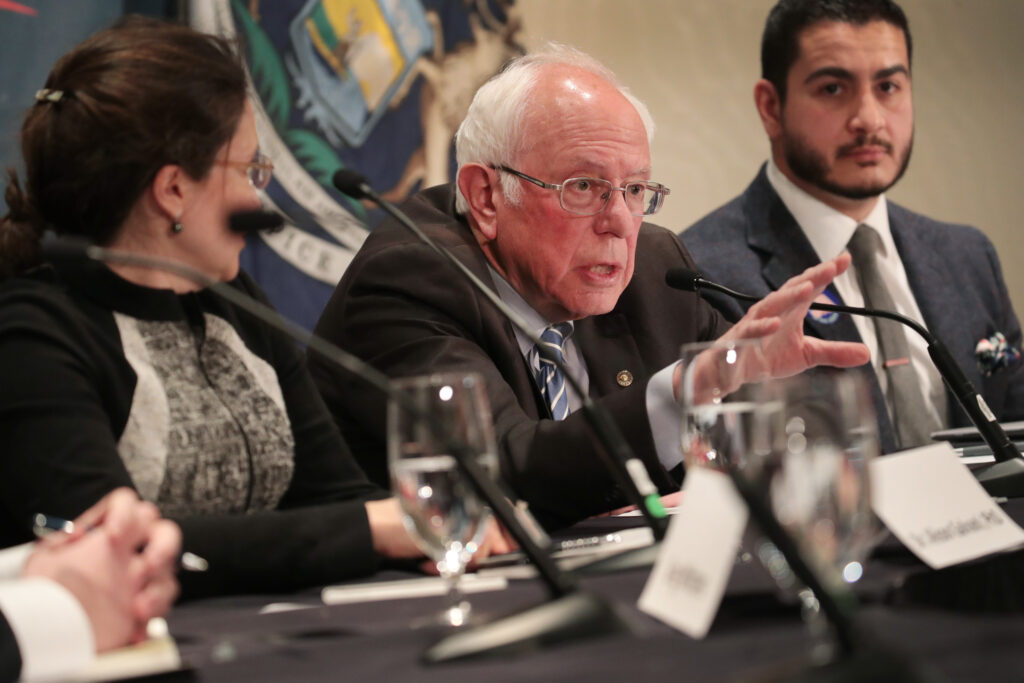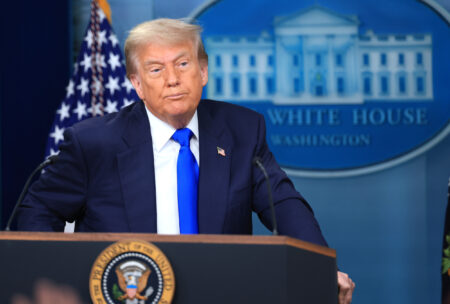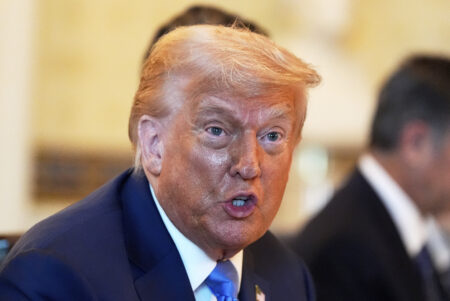Democratic U.S. Senate candidate Abdul El-Sayed of Michigan has raised more than $24,000 per day since launching his campaign 75 days ago, averaging a bigger daily fundraising haul than his counterparts.
The progressive told Newsweek on Tuesday that he will “never” accept money from political action committees (PACs).
Why It Matters
Multiple Michigan Democrats are vying to replace Senator Gary Peters, who is not running for reelection in 2026 after holding a seat since 2015. El-Sayed, a former public health official and 2018 gubernatorial candidate, announced his campaign on April 17 and has been endorsed by progressive Senator Bernie Sanders, a Vermont independent.
The campaign is in full swing as El-Sayed tries to differentiate himself from State Senator Mallory McMorrow, U.S. Representative Haley Stevens of Michigan’s 11th District, and former Michigan state House Speaker Joe Tate.
What To Know
The El-Sayed campaign announced on Tuesday that it had raised $1.8 million in the second quarter of this year, receiving over 22,000 donations from 17,000 individual donors. Ninety-five percent of donations were under $100.
El-Sayed closed the quarter with $1.1 million cash-on-hand. His campaign touts being the highest in terms of dollars-per-day rate, raising an average of more than $24,000 per day. They essentially took his total haul divided by the days he’s been in the race.
Official fundraising totals will not be released until mid-July.
On July 1, the McMorrow campaign announced that it had raised more than $2.1 million in the second quarter, with donations received from over 28,000 individual donors. About 88 percent of the contributions received were $50 or less, and 97 percent were $100 or less. She was the first Democrat to join the race 90 days ago.
Last week, the Stevens campaign reported more than $2.5 million in the second quarter, closing with roughly $2 million in cash reserves—a total that includes the transfer of $1.2 million from her U.S. House campaign account to her Senate account. She entered the race 70 days ago.
The El-Sayed campaign said Stevens’ transferred money is not taken into account when considering the daily fundraising average they tout.
“When you raise funds like we do, you don’t take corporate money and you’re not asking folks who would like to corrupt our system to corrupt it through you—and instead you ask good people for their money,” El-Sayed, 40, told Newsweek on Tuesday during a phone interview from the campaign trail.
He told a story about meeting a man who works an assembly line and makes $30 per hour, who pledged to give El-Sayed $1 out of that hour every month.
“That just means so much to me because he sees himself in this movement, and he’s willing to literally put his money down on that,” El-Sayed said. “I’m just really, really grateful for that.
“I’m grateful that we have literally thousands of people all over the state in the country who see this movement as being part of what they hope our politics can produce, so that’s awesome.”
El-Sayed, who has also been endorsed by California Representative Ro Khanna and Minnesota Attorney General Keith Ellison, said that he takes pride in his campaign’s vow never to accept money from PACs.
“It’s not just that I’m not taking corporate money in this race; it’s that I’ve never taken corporate money,” he said. “I will never take corporate money…A lot of folks think that it’s an on-off switch, right? It’s like people who take steroids their whole career, then all of a sudden stop taking them, and people think that they’re all natural.”
“I just don’t buy it,” he said. “I don’t think voters buy it. But that’s also part and parcel of the fact that I’m not a career politician.”
Democrats in general should not engage in politics that involve accepting such donations from wealthy donors, El-Sayed added, compartmentalizing the process as receiving money from billionaires who “write you a big check and then put up glossy ads to tell people who’ve never met you or seen you that you’re the choice.”
The McMorrow campaign has stated that it will not accept any corporate PAC dollars.
What People Are Saying
U.S. Senate candidate Abdul El-Sayed told Newsweek: “Democrats think that the best way to win is to try and beat him at his own game. You just won’t do that. Our job is to be able to capture the kind of attention because we’re providing an antidote to what he does. If [President Donald Trump is] bringing hate, we bring love. If he’s bringing more pain, we’re bringing healing. If he’s bringing that danger and insecurity, we’re bringing a kind of empathy and a kind of understanding.
“That doesn’t mean that we’re not going to stand up to Trump. Don’t get me wrong; I got receipts. I don’t back down to bullies and I’ve met my fair share of them. But at the same time, we’re not going to beat him just giving in to this idea of, like, perpetual political war. I think we beat him by being able to see the pain that he’s been able to weaponize for his power and to respond to that with real solutions that will actually solve people’s problems.”
Michigan State Senator Mallory McMorrow, in a July 1 statement: “We did it all starting from zero. Because unlike somebody who already holds federal office, I couldn’t just roll my campaign funds into our new Senate account. I had to start from zero. There were a lot of people ready to count me out for that exact reason before we even got started.
“And I’m making this promise to you right now: I will not take a dime of corporate PAC money on this campaign. And sure, doing it this way is going to be harder. It means our donations are going to come in $5 and $10 at a time, not $5,000 and $10,000 at a time. But in this moment, you deserve nothing less. Oh, and one more thing—for anybody who might doubt us—we’re just getting started.”
U.S. Representative Haley Stevens of Michigan, in a statement last week: “I’m honored to have received the support of so many Michiganders to win this Senate seat. My life has been defined by moments when Michigan is in crisis, and during these uncertain times I will continue to stand against the Trump administration’s chaos and reckless policies and do what I have always done: fight for Michigan and win for Michigan.”
What Happens Next
Michigan’s U.S. Senate race will be one of the closest watched next year as Republicans view it as a major battleground to provide Trump with even more of a buffer on Capitol Hill.
Before Democratic Governor Gretchen Whitmer’s win in 2018, the state had been led by a Republican for two terms.
Former GOP Representative Mike Rogers, who narrowly lost his 2024 Senate race to now-Senator Elissa Slotkin, has already declared his candidacy and spoken to Newsweek about his confidence heading into 2026.
Read the full article here

















